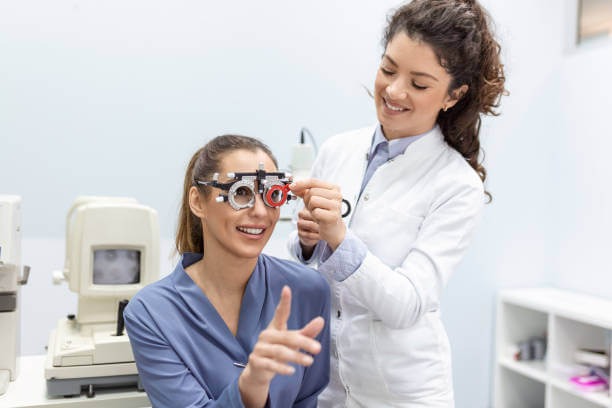Our vision is one of the most critical senses, shaping how we interact with the world. Eye health often goes unnoticed until a problem arises, but proactive care can prevent many issues. This is where ophthalmologists come into play. As medical doctors specialising in eye care, ophthalmologists provide comprehensive services that go far beyond routine eye exams. Their role encompasses everything from diagnosing common conditions to performing intricate surgeries, making them vital to maintaining and preserving eye health.
What Is An Ophthalmologist?
A physician with expertise in identifying and treating conditions affecting the eyes and vision is known as an ophthalmologist. Unlike optometrists, who focus on eye exams and prescribing corrective lenses, ophthalmologists are trained to provide full-spectrum eye care. They are capable of diagnosing conditions affecting the eyes, writing prescriptions for drugs, doing surgery, and even treating complicated systemic conditions like hypertension or diabetes that have an impact on the eyes.
After earning a medical degree, candidates must complete several years of specialised study in ophthalmology in order to become ophthalmologists. This extensive education equips them to handle a wide variety of eye conditions and perform surgeries like cataract removal, glaucoma treatment, and even complex retinal surgeries.
Comprehensive Eye Examinations
A comprehensive eye exam with an ophthalmologist goes beyond a simple vision check. It includes a thorough assessment of the overall health of your eyes, looking for any signs of disease or degeneration. Tests for visual acuity, eye alignment, depth perception, and eye pressure (to screen for glaucoma) are commonly included in these examinations. The ophthalmologist Harley street will use cutting-edge diagnostic tools to evaluate the retina, optic nerve, and blood vessels in your eye.
This comprehensive approach ensures that even subtle signs of vision-threatening conditions are detected early. Macular degeneration, cataracts, and glaucoma are examples of diseases that can progress gradually and show no signs until they cause substantial harm. Regular visits to an ophthalmologist can catch these conditions early, leading to better outcomes and less invasive treatments.
Treating Eye Diseases
One of the most critical roles an ophthalmologist plays is in diagnosing and treating eye diseases. If left untreated, common disorders including glaucoma, cataracts, and macular degeneration can all result in considerable vision loss or blindness. Ophthalmologists are equipped to detect these conditions in their early stages and recommend appropriate treatments.
One disorder that causes vision loss is glaucoma, which is caused by elevated intraocular pressure that harms the optic nerve. It often presents no symptoms in its early stages, making routine eye exams crucial for detection. Once diagnosed, ophthalmologists can prescribe medications to reduce eye pressure or, in more severe cases, recommend laser treatments or surgery to prevent further damage.
Another common condition that causes blurry vision is cataracts, which arise when the lens of the eye becomes clouded. Ophthalmologists may remove the cloudy lens and replace it with an artificial one in order to restore clear vision. This surgery is one of the most common and successful medical procedures performed globally.
Macular degeneration, which primarily affects older adults, causes damage to the central part of the retina and leads to a loss of sharp, central vision. While it cannot be cured, early detection by an ophthalmologist can slow its progression and preserve remaining vision through medications or laser therapies. For those looking for the best laser eye surgery in London, it’s crucial to consult with experienced specialists to ensure the most effective treatment options for maintaining eye health.
Surgical Expertise
One of the key differences between ophthalmologists and other eye care professionals is their ability to perform surgery. Surgical treatments performed by ophthalmologists range from simple operations such as cataract removal to more complex ones like retinal detachment repair.
In addition to treating conditions like cataracts and glaucoma, ophthalmologists also perform surgeries to correct refractive errors such as nearsightedness, farsightedness, and astigmatism. For those looking to lessen their reliance on glasses or contact lenses, procedures like LASIK have grown in popularity. An ophthalmologist can determine whether a patient is a good candidate for such surgeries and provide follow-up care to ensure the best outcomes.
Managing Systemic Diseases Affecting The Eyes
Many systemic diseases, such as diabetes, hypertension, and autoimmune disorders, can impact eye health. Diabetic retinopathy, a complication of diabetes, occurs when high blood sugar levels damage the blood vessels in the retina, leading to vision loss. Hypertension can also affect the blood vessels in the eyes, increasing the risk of vision problems or even blindness.
Ophthalmologists play a crucial role in managing these systemic diseases by monitoring their effects on the eyes. In the case of diabetic retinopathy, for instance, regular eye exams with an ophthalmologist can detect early signs of damage, allowing for timely interventions that prevent further vision loss. This interdisciplinary approach to healthcare ensures that eye health is not overlooked in patients with chronic conditions.
Conclusion
The comprehensive care provided by ophthalmologists is essential for maintaining and preserving vision throughout life. From early detection and treatment of common eye conditions to performing complex surgeries and managing systemic diseases, ophthalmologists offer a wide range of services that ensure optimal eye health. Regular visits to an ophthalmologist should be a key part of your healthcare routine, particularly as you age, to safeguard your vision and enjoy a lifetime of clear sight. By prioritising eye health, you can help prevent vision loss and maintain your quality of life for years to come.



